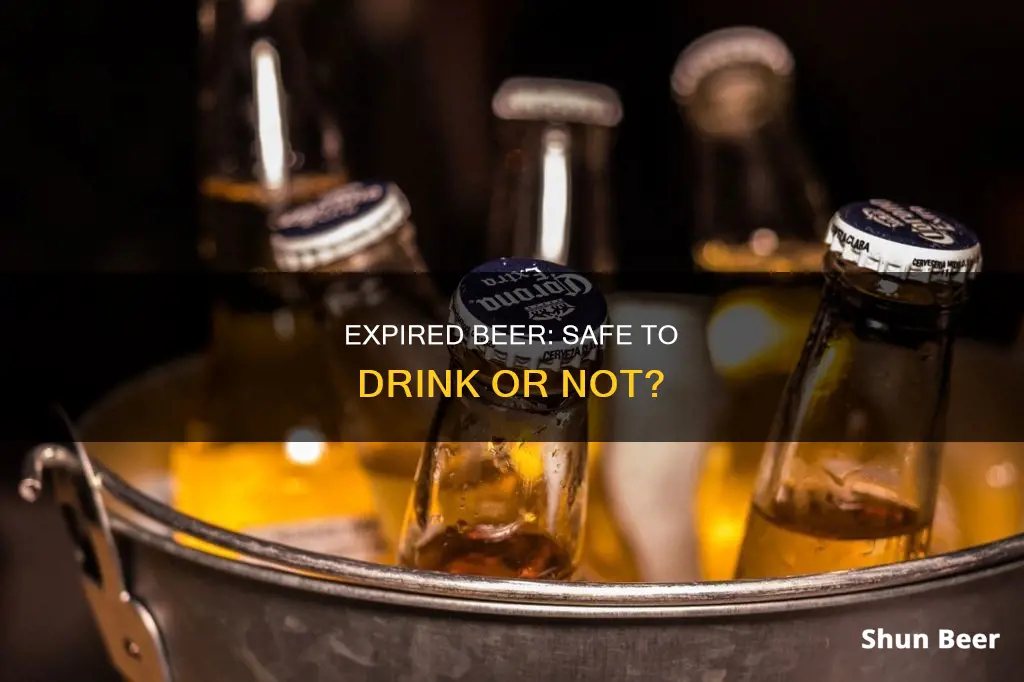
Drinking out-of-date beer will not make you ill, but it might taste unpleasant. Beer has a best before date, which is a guideline on quality rather than safety. Beer's low pH level and alcohol content make it an unfriendly environment for microorganisms. However, the taste of beer changes over time, and it can become stale or develop a vinegary taste, which indicates bacterial growth.
| Characteristics | Values |
|---|---|
| Can drinking out-of-date beer make you ill? | No, but it may taste unpleasant. |
| Does beer have an expiration date? | Yes, but it is a "best before" date, not a "use by" date. |
| How long does beer last after its expiration date? | At room temperature, 5-9 months. In a refrigerator, up to 2-3 years. |
| Does the type of beer affect its shelf life? | Yes, stronger beers like stouts and porters last longer than lighter beers like lagers and pilsners. |
| How does light exposure affect beer's shelf life? | UV rays can cause beer to develop a skunky odour and taste, especially in clear or green bottles. |
What You'll Learn
- Beer's fermentation process, low pH level and alcohol content make it hard for microorganisms to survive
- Beer can be stored for years without spoiling if it's sealed
- Beer that has lost its fizz or has a vinegary taste should be thrown out
- Beer should be stored in a cool, dark place, preferably a refrigerator
- Opened beer has a shelf life of about a day

Beer's fermentation process, low pH level and alcohol content make it hard for microorganisms to survive
Beer is produced with ''best before'' dates, which are more of a guideline on quality than safety. This means that beer will start to lose its quality after the stated date, but it can still be consumed. The fermentation process, low pH level, and alcohol content make it challenging for microorganisms to survive in beer. Therefore, even if a sealed beer sits on the shelf for years, it is unlikely to cause illness.
The pH level of beer is low enough that no known pathogens can survive within it. The fermentation process used in brewing, along with the low pH and alcohol content, make beer an unfriendly environment for microorganisms. This is why beer has a longer shelf life than other foods and beverages.
However, it is important to note that the taste of beer changes over time. While some beers improve with age, similar to wine and whiskey, others do not age as gracefully. Beers with higher alcohol content, such as stouts and porters, tend to have a longer shelf life than lighter beers. Additionally, the way beer is stored also plays a role in its longevity. It is recommended to store beer in a cool, dark place, preferably a refrigerator, to maintain its freshness and quality.
Beer and Aleve: A Safe Mix?
You may want to see also

Beer can be stored for years without spoiling if it's sealed
Beer is produced with expiry dates, but these are more of a guideline on quality rather than safety. The "best before" date on a beer bottle or can is to indicate when the beer will start losing its quality. Beer can be stored for years without spoiling if it's sealed. The fermentation process used in brewing beer, as well as its low pH level and alcohol content, make it difficult for microorganisms to survive.
However, the taste of beer changes over time. Even with proper storage, the flavour and quality of beer degrade over time, especially for lighter beers like lagers and pilsners. Beer stored in a refrigerator can last up to two to three years unopened. Opened beer has a shelf life of about a day, regardless of the expiration date. Beer stored at room temperature will likely go bad after four to six months.
It's important to note that heat speeds up the oxidation process, so storing beer in a cool, dark place like a refrigerator is ideal. Additionally, UV light can cause beer to develop a skunky odour and taste, so clear or green bottles are more susceptible to this issue than brown bottles or aluminium cans.
Concussion and Alcohol: A Risky Mix?
You may want to see also

Beer that has lost its fizz or has a vinegary taste should be thrown out
However, drinking out-of-date beer is unlikely to make you ill. The fermentation process used in brewing beer, as well as its low pH level and alcohol content, make beer an unfriendly environment for microorganisms.
That being said, the taste of beer changes over time. Beers past their prime can taste like wet cardboard, overly sweet, or skunky. The longer a beer is stored, the worse it gets.
Drinking Beer on a Pier: What's the Legal Ruling?
You may want to see also

Beer should be stored in a cool, dark place, preferably a refrigerator
Beer is best stored in a cool, dark place, preferably a refrigerator. This is because beer is affected by light, heat, and oxidation.
Light has a huge impact on the quality of beer over time and is responsible for what is known as "skunked beer". Skunky beer occurs when light-sensitive hops, the main preserving ingredient in beer, are exposed to too much light. Clear bottled beer can become light-struck in less than one minute in bright sunlight, a few hours in diffuse daylight, and a few days under normal fluorescent lighting. To avoid this, beer should be stored in brown bottles or cans, or in a dark place.
Heat will accelerate the chemical reaction that breaks down large molecules into small molecules, causing beer to age faster. Exposure to heat can cause the production of dimethyl sulfide (DMS), which can add a cooked-vegetable or cooked-corn flavour and aroma to the beer. It can also cause the breakdown of yeast, which produces a flavour and aroma similar to burning tire rubber.
Oxidation is where oxygen affects the beer. Heat and motion accelerate the oxidative process. The worst effects are seen in pale-coloured beers, where the formation of the trans-2-nonenal compound creates flavours similar to paper or lipstick. The oxidative process can also lead to the development of an unpleasant metallic flavour as the beer ages.
To avoid the negative effects of light, heat, and oxidation, beer should be stored in a cool, dark place, preferably a refrigerator.
Alcohol-free beer: A safe drink for liver disease patients?
You may want to see also

Opened beer has a shelf life of about a day
Oxidation happens when oxygen interacts with the compounds from malt, yeast, and hops — the building blocks of what makes beer delicious. This causes oxidation and that disappointing papery taste. Despite all the advanced techniques and newfangled technology brewers use to package beer, there’s still a tiny amount of oxygen that’ll make it into a can or bottle, which means a change in flavour is inevitable. And the longer it’s stored, the worse it gets.
Once you crack open your bottle or can of beer, oxidation goes into hyperdrive, and if you leave your beer out for long, you’ll be left with a pretty sad version of the beverage. This is true of kegs as well: the pumps used to push the beer out also push oxygen in.
Oxidation isn't the only thing to worry about. Heat speeds up oxidation, so storing beer in a refrigerator is an absolute must. Major changes in temperature — like from an ice-cold cooler to a sun-roasted car — make it even worse. And, sadly, this can’t be reversed. Once beer has been left in a hot trunk or in the summer sand, you’ll have to say sayonara.
Lastly, be mindful of light. Most people assume skunkiness comes from changes in temperature, but it’s actually caused by UV light. Hop compounds are especially sensitive to light and can become "light struck", a chemical reaction that gives off that unpleasant skunky taste. That’s why beer usually comes in dark bottles, which is helpful, but not as good as aluminium cans at blocking out those piercing rays.
Beer and Breakouts: Is Your Skin Safe?
You may want to see also
Frequently asked questions
Drinking out-of-date beer will not make you ill. Beer has a low pH level, and the fermentation process used in brewing makes it difficult for bacteria to grow.
It is safe to drink expired beer. However, if your beer has lost its fizz, it's a sign that the seal was broken and the flavour will be affected.
If your beer has a vinegary taste, it's an indication that bacteria has gotten in. Also, if you notice a bad aroma, or a lack of the usual 'pssst' sound and foaming when you open it, your beer may have gone bad.
Beer typically lasts 5-9 months beyond the expiration date listed on the label at room temperature. In a refrigerator, beer can last up to an additional 2-3 years.
Store your beer in a cool, dark place, preferably the refrigerator. If stored at room temperature, ensure the beer is not exposed to sunlight. Keep bottles and cans upright to minimise oxidation.







